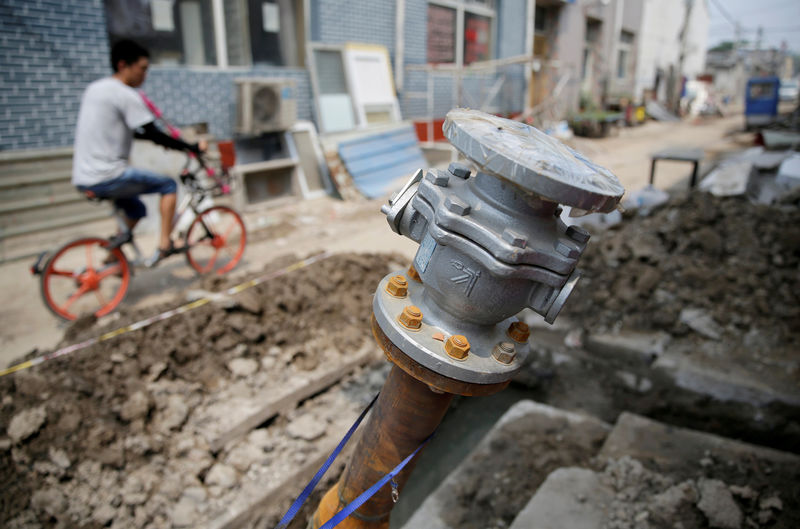 © Reuters. FILE PHOTO: A villager cycles past the gas pipeline construction in Xiaozhangwan village of Tongzhou district on the outskirts of Beijing
© Reuters. FILE PHOTO: A villager cycles past the gas pipeline construction in Xiaozhangwan village of Tongzhou district on the outskirts of BeijingBEIJING (Reuters) – Local authorities in China should not use a one-size-fits-all approach to implement the country’s push to heat millions of homes with this winter, the official English language paper China Daily said in an editorial on Tuesday.
The comment is the strongest sign yet that the central government is increasingly worried, just two weeks into the winter heating season, about the unintended consequences of its experiment to switch the northern part of the country to cleaner burning natural gas from coal.
China made the switch to eliminate the smog that blankets the north during the winter and is caused by emissions from power plants fired by coal, the country’s primary fuel source.
Prices of liquefied natural gas (LNG) have soared over the past month, hitting record highs this week, as 28 cities have turned on their heating systems and factories have converted to the fuel for the first time.
Last week, two major consuming provinces, Hebei and Shandong, warned of shortages and were forced to cut gas supplies to factories in a dramatic step that highlighted the country’s insufficient infrastructure and domestic supplies.
The paper made the warning amid reports that insufficient gas supplies have left some residents without any heating, the paper said.
“Any measures to run after a ‘blue sky’, including the ‘gas-replacing-coal’ campaign some local governments have launched, should fully consider residents’ needs and be tailored to local conditions,” said the editorial.
“They should not be advanced using a one-size-fits-all approach.”
The local authorities have “good intentions” by implementing the central government’s policy, but it should not be at the cost of some people’s well-being and at the risk of their health, it said.
State-owned gas producers are trying to address public concerns about a potential heating crisis a day after the state planner ordered eight regions to “regulate” the gas market.
PetroChina has started up the third phase of the West-East gas transmission project, the government said on Tuesday. The new line can carry 30 billion cubic meters (bcm) of gas from fields in Central Asia and the western region of Xinjiang to consumers in the east.
Separately, China National Offshore Oil Co (CNOOC) [SASACY.UL] (HK:), the country’s largest LNG importer, said it has hired two LNG tankers for emergency storage for the first time to ensure adequate supplies and prevent skyrocketing prices.
CNOOC has said it aims to have 20 bcm of natural gas on hand this winter. China’s winter gas demand will hit a record 23 bcm this year, energy consultants Wood Mackenzie estimate.
Fusion Media or anyone involved with Fusion Media will not accept any liability for loss or damage as a result of reliance on the information including data, quotes, charts and buy/sell signals contained within this website. Please be fully informed regarding the risks and costs associated with trading the financial markets, it is one of the riskiest investment forms possible.
Source: Investing.com



























